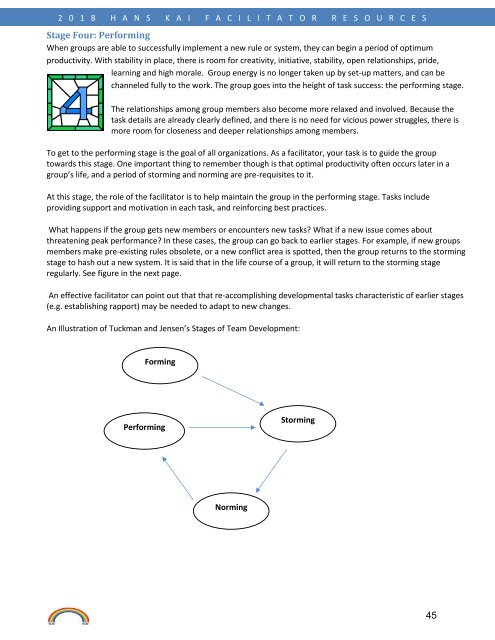2018 Hans Kai Facilitator Resources
- No tags were found...
Create successful ePaper yourself
Turn your PDF publications into a flip-book with our unique Google optimized e-Paper software.
2 0 1 8 H A N S K A I F A C I L I T A T O R R E S O U R C E S<br />
Every company has two organizational<br />
structures: the formal one is written on the<br />
charts; the other is the everyday<br />
relationship of the men and women in the<br />
organization.<br />
Harold H. Geneen<br />
1: Group Development Dynamics<br />
Groups are not stagnant entities; they change. Initial uncertainty and<br />
ambiguity give way to stable patterns of interaction, while relationship<br />
between members wax and wane. To be an effective facilitator, you must be<br />
sensitive to the changes happening within groups.<br />
stage of development they are in.<br />
In this module, we will discuss one of the most widely-used theories of group<br />
development: Tuckman and Jensen’s Model of Team Development. We will<br />
also discuss how a facilitator can best respond to groups depending on what<br />
Stage One: Forming<br />
The initial stage of group development is the forming stage. It is commonly referred to as the<br />
orientation stage or the “getting-to-know-you” stage, as group members still don’t know much<br />
about each other or about the organization. If the organization itself is new, then there might not<br />
be any existing structure or rules in the group yet.<br />
During the forming stage, members tend to feel tensions and uncertainties. After all, group<br />
members are dealing with people they hardly know, and this initial unfamiliarity may leave them feeling<br />
uncomfortable and constrained. Often, members are on guard, carefully monitoring their behavior to make certain<br />
they avoid any embarrassing lapses of social poise.<br />
Without the benefit of a long and solid relationship with the group, involvement and commitment to the<br />
organization may be low. There may also be extreme dependence on leaders, dominant personalities and other<br />
group members.<br />
The forming stage is characterized by many tentative and testing behaviors: explorations of the boundaries of both<br />
rules and tasks. During the forming stage, it is important for the facilitator to:<br />
• Establish rapport among group members<br />
• Encourage members to be comfortable with one another<br />
• Make everyone feel accepted in the group<br />
• Establish rules and guidelines for both task and relational behavior<br />
• Encourage the group to be comfortable with the organization<br />
43

















